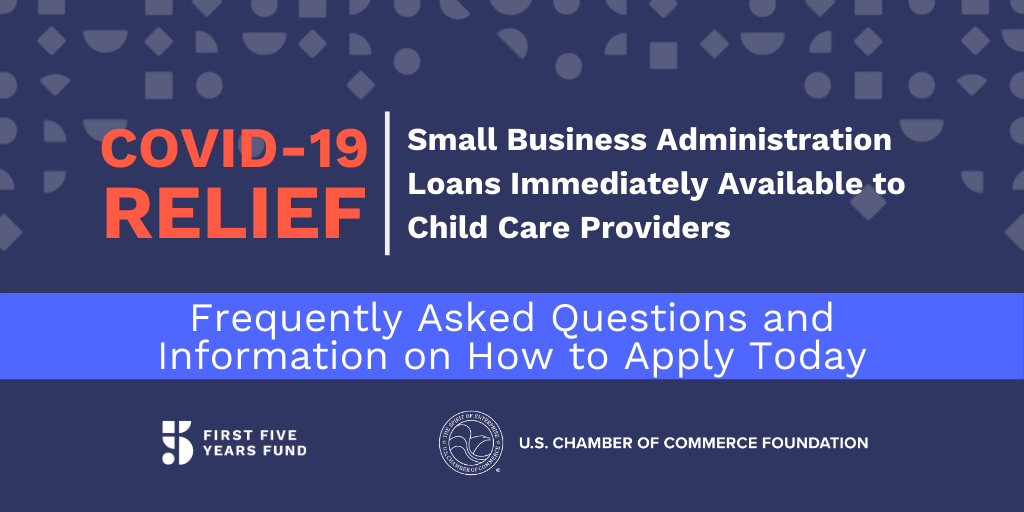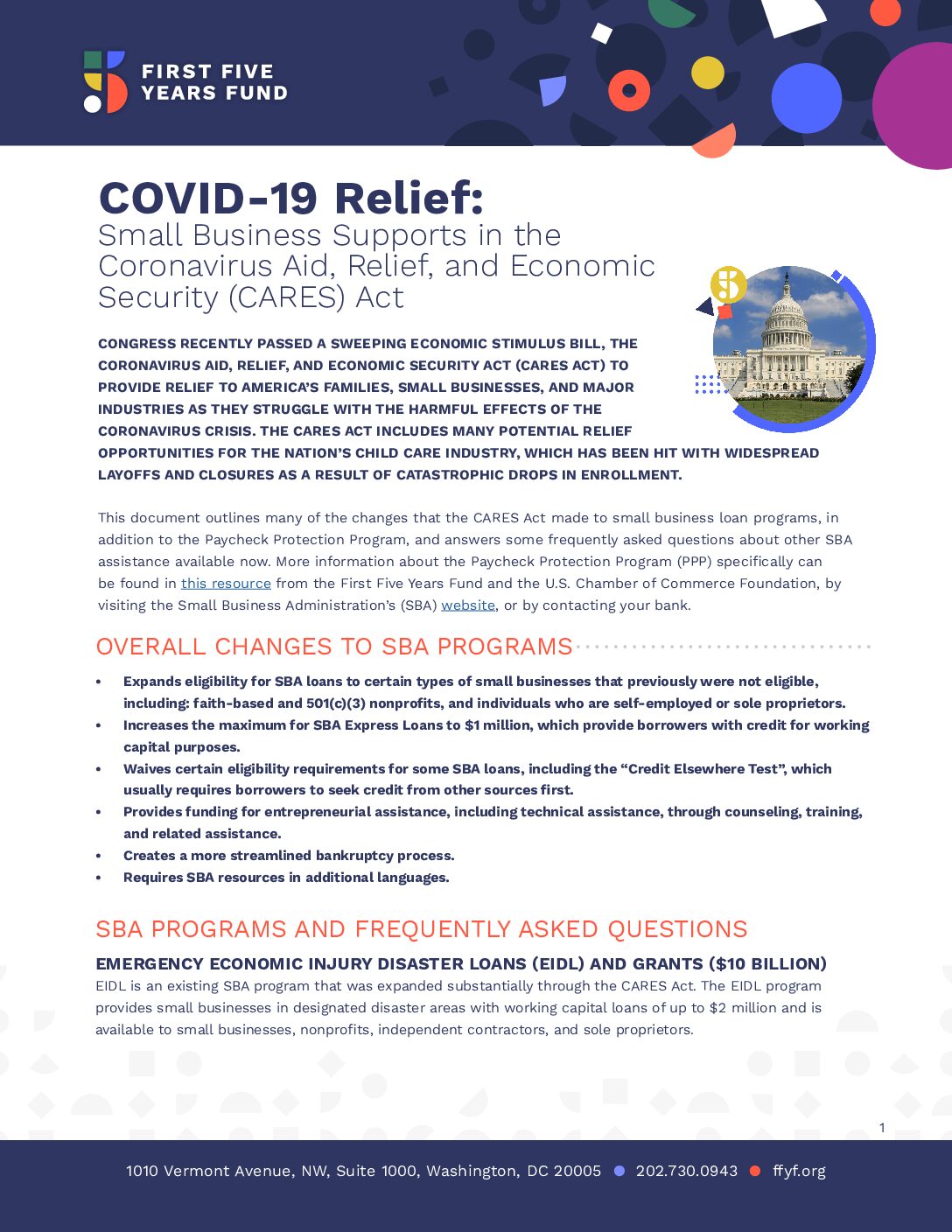Small Business Supports in the Coronavirus Aid, Relief, and Economic Security (CARES) Act

Congress recently passed a sweeping economic stimulus bill, the Coronavirus Aid, Relief, and Economic Security Act (CARES Act) to provide relief to America’s families, small businesses, and major industries as they struggle with the harmful effects of the coronavirus crisis. The CARES Act includes many potential relief opportunities for the nation’s child care industry, which has been hit with widespread layoffs and closures as a result of catastrophic drops in enrollment. This document outlines many of the changes that the CARES Act made to small business loan programs, in addition to the Paycheck Protection Program, and answers some frequently asked questions about other SBA assistance available now. More information about the Paycheck Protection Program (PPP) specifically can be found in this resource from the First Five Years Fund and the U.S. Chamber of Commerce Foundation, by visiting the Small Business Administration’s (SBA) website, or by contacting your bank.
Overall Changes to SBA Programs
- Expands eligibility for SBA loans to certain types of small businesses that previously were not eligible, including: faith-based and 501(c)(3) nonprofits, and individuals who are self-employed or sole proprietors.
- Increases the maximum for SBA Express Loans to $1 million, which provide borrowers with credit for working capital purposes.
- Waives certain eligibility requirements for some SBA loans, including the “Credit Elsewhere Test”, which usually requires borrowers to seek credit from other sources first.
- Provides funding for entrepreneurial assistance, including technical assistance, through counseling, training, and related assistance.
- Creates a more streamlined bankruptcy process.
- Requires SBA resources in additional languages.
SBA Programs and Frequently Asked Questions
Emergency Economic Injury Disaster Loans (EIDL) and Grants ($10 billion)
EIDL is an existing SBA program that was expanded substantially through the CARES Act. The EIDL program provides small businesses in designated disaster areas with working capital loans of up to $2 million and is available to small businesses, nonprofits, independent contractors, and sole proprietors.
Recognizing the urgent need of many small businesses, the CARES Act allows EIDL to provide up to $10,000 in emergency advances for eligible businesses through December 30, 2020. This is an advance on a larger loan application and will be available within three days of application. These advances do not need to be repaid.
Who is eligible for the EIDL?
EIDL loans are available to small businesses, nonprofits currently recognized by SBA, as well as independent contractors, and sole proprietors.
Is this a grant or a loan?
EIDL is traditionally a loan program, however the CARES Act provides $10 billion for the SBA to temporarily offer advances that do not need to be repaid through the program. During the application process for an emergency EIDL loan, any eligible applicant can request an advance of up to $10,000 while the application is pending and it would become available within three days of application. Though it is an advance on the loan, it does not need to be repaid, even if you are denied a larger loan later, effectively making these advances, grants.
What can the emergency EIDL advance be used for?
These advances can be used to maintain payroll, provide sick leave because of COVID-19, and pay other debt obligations that cannot be met due to revenue loss associated with COVID-19.
How does this grant interact with the Paycheck Protection Program (PPP)?
If you received an advance through EIDL and then transferred those funds to the PPP, your advance amount would be considered when determining loan forgiveness.
Does EIDL need to be repaid?
The advance of up to $10,000 does not need to be repaid under any circumstance, even if you are denied a larger loan. However, a larger loan through the EIDL program would need to be paid back. If you receive additional funding through other SBA programs, the EIDL loans can be rolled into them but would be subtracted from the forgiveness amount.
What are the terms of larger EIDL loans?
The interest rate is 3.75% for for-profit businesses and 2.75% for nonprofit businesses, with a 30-year term possible. The first repayment would not be due for one year, although interest begins to accrue at time of disbursement.
How can I apply?
You can apply through SBA’s Disaster Loan Assistance website, and you self-certify your eligibility.
What information do I need to certify my eligibility?
The CARES Act waives several items normally required to apply for the EIDL application process. Applicants do not need their tax documentation, instead they can use their credit score. In an effort to expedite the process, applicants do not need a personal guarantee for loans up to $200,000. Furthermore, businesses that have been operating for less than one year, as well as those who have been unable to obtain a line of credit elsewhere, are eligible to apply.
What’s the deadline for applying for EIDL advances and loans?
EIDL applications end December 30, 2020.
Small Business Debt Relief ($17 billion)
For small businesses with existing loans through SBA who are negatively affected by COVID-19, SBA will pay all principal, interest, and fees on all existing SBA loan products (including 7(a), Community Advantage, 504, and Microloan programs), for six months.
Additional Frequently Asked Questions
Who can make SBA loans?
Lenders currently approved to make SBA loans can begin lending and SBA will expand the number of lenders to meet the demand.
What about religious organizations?
Religious organizations are eligible but only to cover payroll costs of an associated business, like a thrift store or child care center.
How much can I borrow?
The amount you can borrow depends on which loan program you apply through.
What can the loan be used for?
Each loan program has specific allowable uses. Generally, loans can be used to maintain payroll, making rent or mortgage payments, repay obligations that cannot be met due to revenue loss, and provide paid leave to employees who are unable to work due to COVID-19.
Note: If the proceeds are used for fraudulent purposes, the U.S. government will pursue criminal charges against you.
Other CARES Act Incentives for Small Business
Tax Incentives
In addition to loans and grants through the SBA, the CARES Act includes several tax incentives that could provide valuable support to small businesses as they navigate this crisis.
Employee Retention Tax Credit
This allows employers to claim a refundable payroll tax credit equal to 50% of wages (maximum of $10,000 in wages per employee) paid to employees during the crisis. Only employers who see a full or partial suspension of operations due to a shutdown order, or who see a decline in their gross receipts by more than 50% would be eligible. This tax credit is available for wages paid from March 13, 2020 to December 31, 2020.
Delay of Payroll Taxes
If an employer does not receive loan forgiveness through the Paycheck Protection Program, they can delay the payment of the employer share of Social Security tax. Additionally, those who are self-employed can defer the payment of the employer share. Half of this deferred amount would be due to be paid on Dec. 31, 2021 and the other half by Dec. 31, 2022.
Modification of Net Operating Losses (NOL)
CARES now allows NOLs from 2018, 2019, and 2020 to be carried back five years and allow NOLs to fully offset income. This will allow businesses to use losses and amend prior year returns to provide liquidity during the outbreak.
Modification on Limitation of Losses for Sole Proprietors and Pass-Throughs
This provision temporarily lifts the loss limitation for sole proprietors and pass-throughs with the intention of allowing them to utilize excess losses to provide necessary cashflow.
Increase to Interest Expense Deduction
This would allow businesses to deduct additional interest, raising from 30% to 50% of taxable income, from their 2019 and 2020 taxes.
Subscribe to FFYF First Look
Every morning, FFYF reports on the latest child care & early learning news from across the country. Subscribe and take 5 minutes to know what's happening in early childhood education.




